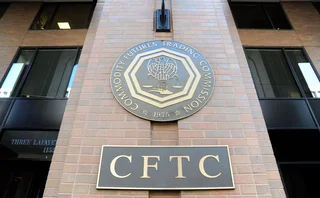When it Comes to Regulation, Always Bet Against Me

I suck at making predictions. Well, not all predictions. I am very good at doping horse races. And I have an uncanny ability to guess—weeks in advance—when Lindsay Lohan will appear on the cover of Star magazine. Call it a sixth sense.
But when it comes to predicting how the regulators are going to come down on an issue, well, I'm useless. A few weeks ago I made the now-idiotic proclamation that the US Securities and Exchange Commission (SEC) would stick to its original deadline of Jan. 1, 2012 for large hedge funds to comply with the new Form PF (Private Fund) requirements. (Granted, I hedged my bet by saying that I wouldn't bet money on it.)
Then, on Wednesday, the SEC announced that, among many things, it would push back the compliance deadline by almost a full year for most firms. Here's a quick overview of some of the changes—and keep in mind that the Commodity Futures Trading Commission (CFTC) will vote within the next week whether to jointly adopt these reporting requirements:
• SEC-registered advisors with at least $150 million in private fund assets under management must file Form PF, though the requirements differ by size and type of institution.
• Definitions: “Large” hedge funds are those that have at least $1.5 billion in assets under management (AUM); “large” private equity funds have at least $2 billion AUM.
• Large hedge funds must file within 60 days of the end of each fiscal quarter. Large liquidity fund advisers must file Form PF within 15 days of the end of each fiscal quarter. Large private equity advisers must file annually within 120 days of the end of the fiscal year. Smaller private fund advisers must file Form PF once a year, within 120 days of the end of the fiscal year.
• Firms with at least $5 billion AUM have to begin filing after June 15, 2012. Everyone else will start on Dec. 15, 2012.
Suffice it to say that the hedge fund community should be happy by all the concessions that the SEC made to its original Form PF proposals. Sure, some are still a bit peeved that the term "large" pertains to those funds managing $1.5 billion in assets instead of $5 billion—or at least $3 billion—but this form, while still onerous, became much more manageable this week. If doing away with the rule wasn't an option, this was a pretty good result.
I'd say there is only one loser: those vendors that already have a Form PF solution in place and marketed. If the SEC had come back and said it was sticking to Jan. 1, and it was 15 days and not 60, I suspect that those vendors would be receiving a lot of calls today.
But now firms can place this on the backburner, even though I still believe that it's far smarter to address this issue today rather than in September 2012.
Granted, the technology demands have been dulled. The significance of the change from 15 days to 60 cannot be understated—that turns it from an IT-intensive problem, to a problem that can be solved with increased manpower at the end of each quarter. Sure, that's not necessarily efficient, but that is what will happen at many firms.
Also, the SEC won’t ask for position-level data—though I will wait to talk about specific requirements until I see the actual form—so that means less of a data-recovery burden. This is not to diminish the fact that this is still a significant undertaking to pull all this information together, but it's not nearly as oppressive as it could have been.
Yep, my prediction was wrong. So, with all that being said, how about a few more predictions: The CFTC will vote against jointly adopting the SEC's Form PF rules; the European Commission will back off its curbs on high-frequency trading; and all of Dodd–Frank will at some point be struck down by the various US courts.
Reverse jinx? We'll see.
Also, five weeks from today, look for Lindsay Lohan to be on the cover of Star because of a tawdry love triangle with Justin Bieber and Charlie Sheen. Wanna make a bet? How about $5?
Only users who have a paid subscription or are part of a corporate subscription are able to print or copy content.
To access these options, along with all other subscription benefits, please contact info@waterstechnology.com or view our subscription options here: http://subscriptions.waterstechnology.com/subscribe
You are currently unable to print this content. Please contact info@waterstechnology.com to find out more.
You are currently unable to copy this content. Please contact info@waterstechnology.com to find out more.
Copyright Infopro Digital Limited. All rights reserved.
As outlined in our terms and conditions, https://www.infopro-digital.com/terms-and-conditions/subscriptions/ (point 2.4), printing is limited to a single copy.
If you would like to purchase additional rights please email info@waterstechnology.com
Copyright Infopro Digital Limited. All rights reserved.
You may share this content using our article tools. As outlined in our terms and conditions, https://www.infopro-digital.com/terms-and-conditions/subscriptions/ (clause 2.4), an Authorised User may only make one copy of the materials for their own personal use. You must also comply with the restrictions in clause 2.5.
If you would like to purchase additional rights please email info@waterstechnology.com
More on Regulation
Europe is counting its vendors—and souring on US tech
Under DORA, every financial company with business in the EU must report use of their critical vendors. Deadlines vary, but the message doesn’t: The EU is taking stock of technology dependencies, especially upon US providers.
Regulators can’t dodge DOGE, but can they still get by?
The Waters Wrap: With Trump and DOGE nipping at regulators’ heels, what might become of the CAT, the FDTA, or vendor-operated SEFs?
CFTC takes red pen to swaps rules, but don’t call it a rollback
Lawyers and ex-regs say agency is fine-tuning and clarifying regulations, not eliminating them.
The European T+1 effect on Asia
T+1 is coming in Europe, and Asian firms should assess impacts and begin preparations now, says the DTCC’s Val Wotton.
FCA sets up shop in US, asset managers collab, M&A heats up, and more
The Waters Cooler: Nasdaq and Bruce ATS partner for overnight market data, Osttra gets sold to KKR, and the SEC takes on DOGE in this week’s news roundup.
Waters Wavelength Ep. 312: Jibber-jabber
Tony, Reb, and Nyela talk about tariffs (not really), journalism (sorta), and pop culture (mostly).
Experts say HKEX’s plan for T+1 in 2025 is ‘sensible’
The exchange will continue providing core post-trade processing through CCASS but will engage with market participants on the service’s future as HKEX rolls out new OCP features.
No, no, no, and no: Overnight trading fails in SIP votes
The CTA and UTP operating committees voted yesterday on proposals from US exchanges to expand their trading hours and could not reach unanimous consensus.








